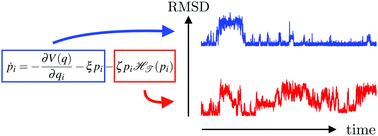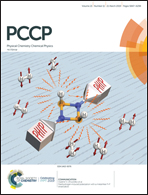Fast Nosé–Hoover thermostat: molecular dynamics in quasi-thermodynamic equilibrium†
Abstract
An extension of the Nosé–Hoover thermostat equation for molecular dynamics (MD) simulation is introduced, which perturbs fast degrees of freedom out of canonical equilibrium, while preserving the average temperature of the system. Based on the generalised Liouville equation, it is shown that the newly introduced fast Nosé–Hoover (FNH) equations give rise to a dynamical system with a well-defined non-equilibrium probability distribution. Corresponding thermostat parameters are identified, which in principle allow to sample arbitrarily close to canonical equilibrium. Results show that the dynamic system properties (e.g. self-diffusion, shear viscosity, dielectric permittivity and rotational relaxation times) are only moderately perturbed for typical FNH setups. However, the non-equilibrium FNH equations modify the occurrence of rare events substantially and thus offer a novel approach for enhanced sampling in MD. In particular, it is shown that the FNH thermostat increased significantly the frequency of the folding and unfolding process of short β-peptides. The efficiency of the phase-space exploration solely depends on the additionally imposed quasi-equilibrium conditions, i.e. it does not rely on any modification of the potential-energy surface.



 Please wait while we load your content...
Please wait while we load your content...